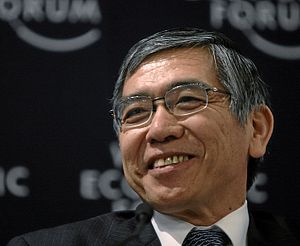On Thursday the Bank of Japan‘s Policy Board’s vote on monetary policy was unanimously in favor of holding a steady course of conducting money market operations “to increase Japan’s monetary base at an annual pace of 60 trillion to 70 trillion yen [$569 – $664 billion] in order to reach its 2 percent inflation target under its ‘quantitative and qualitative’ easing policy,” according to the Jiji Press. In addition to keeping the monetary policy unchanged, the Bank of Japan Governor Haruhiko Kuroda also voiced his support for a weaker yen and a stronger dollar, saying “I don’t believe that a weakening yen is undesirable for the Japanese economy.”
Despite the economic setbacks in the quarter following the April consumption tax increase from 5 to 8 percent, the BOJ stated its overall view of the economy hasn’t changed, and that the economy “has continued to recover moderately as a trend” while the effects of the tax increase “have gradually begun to wane as a whole.” Private consumption “remained resilient” while industrial production “has recently shown some weakness” yet it “has continued to increase moderately as a trend.”
Kuroda was even more optimistic in his personal statements, saying Japan’s “virtuous economic cycle” was still holding, and that monetary and fiscal tools could be utilized to ameliorate any similar economic problems that might arise from the next consumption tax increase in October 2015 from 8 to 10 percent. His statements on the possible further weakening of the yen could be worrying for companies vulnerable to the increased costs in imports (particularly for energy) that such a weakening would entail, which could further add to production costs. Bank of Tokyo-Mitsubishi UFJ’s chief currency strategist Minori Uchida said that if the yen were to weaken toward 110 to the U.S. dollar, it would “also add pressure to prices, weighing on households.”
BOJ analysts who spoke with the Wall Street Journal’s Japan Real Time speculated that Kuroda’s statements were a nod to the second quarter’s poor economic numbers effect on the BOJ’s 2 percent inflation target. A weaker yen could indeed drive up prices on some goods, which could in turn pull inflation higher. However, that would not be part of a “virtuous economic circle,” in which consumption, not a weaker yen, drove up prices and thus wages. If inflation does manage to increase in the short-term from its current level of 1.3 percent, it will be interesting to see which of these is the bigger factor.
































